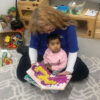Don’t overprotect children from money issues

Findings from a report released by the government-backed Money Advice Service, demonstrate a worrying lack of money skills among the UK’s children and young people. Millions of Britain’s young people are set to enter adulthood unprepared to handle their money and at increased risk of being plunged into life-changing debt.
The survey found that children whose parents involved them in decisions and discussions about money and allowed them to experience using money from as young as four, are more likely to develop vital financial skills. These skills can have a major positive impact on their ability to save, budget and plan ahead financially in later life. However, children who aren’t included in these discussions, or don’t experience using money, risk being left behind.
The report showed that children who didn’t have a say in spending their own money were substantially less likely to save. Of 12 – 17 year olds surveyed, when asked how they would manage if given £100, those whose parents decided how their money was spent were likely to save the smallest amount (£53.65). This compared to those whose parents included them in money discussions, who were likely to save an average of around 20% more.
Children (aged 12-17) whose parents decide how they spend their money are also nearly five times more likely to say that borrowing money didn’t bother them – even if they had no plans to pay it back (19%, compared to 4% who decide on their own or with their parents).
This group were also more likely to choose unnecessary purchases over essential expenditure. The survey asked children aged four to six to choose between buying a toy and buying lunch. 30% of children whose parents decided how they spent their money chose the toy, compared to 17% where the child decides how they spend their money.
Finally, these children are less likely to be confident in managing their money. Only one in three (35%) whose parents made money decisions for them said they were confident in handling their finances.
The research also showed that parents are keen to be involved with their children’s money management skills. 90% think it’s important to help their child learn about money and 81% think they can impact their child’s ability to manage money in adult life.
Previous research has shown that our attitudes towards money can be set from as young as seven. However, many parents are still leaving it too late to intervene and failing to take decisive action to help their children. The research findings showed that the majority of parents were likely to overestimate the age at which they should talk to their children about money issues including saving, bills and debt
Furthermore, a quarter (24%) thought they should wait until their children were in secondary school before teaching them the importance of saving. A further 31% of parents of 16-17 year olds said they didn’t set and stick to money rules with their teenager. And 17% said they rarely or never spoke to them about the risks of getting into debt.
How to include your children in money discussions and decisions:
• Give children the chance to pay for things from an early age, with their own money. For example, instead of buying treats for them during your weekly shop, give them the money and explain to them that they can pick what they want, but when the money is gone,
it’s gone.
• Include your children in discussions about bills, to give them an idea of how household finances run. Explain things like direct debits, monthly/quarterly bills and energy tariffs. Frame it in an engaging and interesting way – tell them they’re helping to keep the lights on, for example.
• If you give your children pocket money, encourage them to set a little aside each month to save up for something they really want. Regularly remind them to save, even if it’s a small amount each month.
• Open a savings account on behalf of your child. Try and save into it regularly, even if it’s just a few pounds a month. Include them in this, get them to go and make deposits in person at a bank branch and let them know how much money is in their account. Some of these accounts also provide a gift, like a moneybox, which can be a nice incentive to save
• For very young children, just getting them used to what money is from a young age can be a great start. Give them the opportunity to handle money and explain to them what money is.
• For slightly older children, give them the chance to manage their money digitally, to get them used to things like mobile banking.











